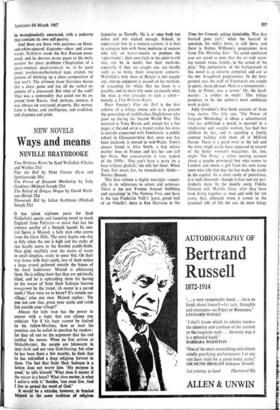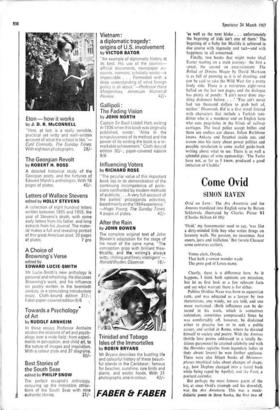NEW NOVELS
Ways and means
NEVILLE BRAYBROOKE
Tree Without Roots by Syed WaIiullah (Chatto and Windus 21s) Play the Ball by Peter Forster (Eyre and Spottiswoode 30s) The Power of Sergeant Mettleship by Judy Gardiner (Michael Joseph 25s) The Ballad of Dingus Magee by David Mark- son (Blond 25s) Diamonds Bid by Julian Rathbone (Michael Joseph 25s) It has taken eighteen years for Syed Waliullah's poetic and haunting novel to reach England from Pakistan—a novel that has the timeless quality of a Bengali legend. Its cen- tral figure is Majeed, a holy man who comes from the Garo Hills. The story begins one day in July when the sun is high and the stalks of rice hardly move in the flooded paddy-fields. Men glide stealthily over the sheets of water in small dinghies, ready to spear fish. On their way home with their catch, two of them notice a large crowd gathered outside the house of the local landowner. Majeed is addressing them. He is telling them that they are spiritually blind, and he is upbraiding them for having let the mazar of Saint Shah Sadeque become overgrown by the forest. (A mazar is a sacred tomb.) 'How were we to know? It's outside our village,' cries one man. Majeed replies: 'Do you not sow rice, graze your cattle and catch fish outside your village?'
Always the holy man has the power to answer with a logic that can silence any criticism. Yet if his logic cannot be faulted by his fellow-Muslims, then at least his premises can be called in question by readers: for they all rest on the argument that the end justifies the means. When he first arrives at Mahabbatpur, the people are lukewarm in their faith and not very God-fearing; but after he has been there a few months, he finds that he has enkindled a deep religious fervour in them. The fact that Saint Shah Sadeque is a fiction does not worry him. 'My purpose is good,' he tells himself. 'What does it matter if the mazar is a hoax? What does matter, is what I achieve with it? Besides, 'one must live. And I live to spread the word of God: It would be a mistake, however, So bracket Majeed in the same tradition of religions hypocrisy as Tartuffe. He is at once both too naive and not wicked enough. Indeed, to understand him in a western context, it is best to compare him with those mediums at seances who rely on butter-muslin to produce the `apparitions': their own faith in the spirit world may not be in doubt, but their methods, especially if they are caught out, are hardly such as to bring them long-term converts. Waliullah's holy man of Bengal is not caught out, and no judgment is passed on his methods of crusading for Allah. But the book is a parable, and its short title sums up exactly what the man is who crusades in such a spirit— namely, a Tree Without Roots.
Peter Forster's Play the Ball is the first volume of a trilogy whose aim is to present the generation of middle-class Englishmen who grew up during the Second World War. The narrator is Tony Bevan, and, except for a few pages at the end set in a transit camp, his story is entirely concerned with Fenchurch—a public school in Gloucestershire that, once war has been declared, is moved to mid-Wales. Tony's closest friend is Alex Smith, a boy whose mother lives in France and lets her son call her Nora. Her conversation is very typical of the 1930s: 'One can't have a party on a boat without gladioli,' she tells her lover. When Tony first meets her, he immediately thinks— Norma Shearer.
This first volume is highly nostalgic—especi- ally in its references to actors and actresses. There is the late Yvonne Arnaud 'bubbling and squeaking' in The Nutmeg Tree, and there is the late Frederick Valk's 'great, gored bull of an Othello'; there is Rex Harrison in No Time for Comedy asking inimitably, 'Has that bastard gone yet?,' when the bastard in question, his wife's lover, is still there, and there is Emlyn Williams's programme note from The Morning Star: `To avoid confusion you are asked to note that the air-raid warn- ing sounds twice, faintly, in the action of the play.' The authenticity of the background of this novel is as cleverly compiled and cut as the BBC Scrapbook programmes. In the fore- ground, too, the staff of Fenchurch are caught in quick, sharp phrases. Here is a housemaster: 'Life, to Potter, was a scrum.' Or, the head- master: 'a soldier in mufti.' This trilogy promises to be the author's most ambitious work to date.
Judy Gardiner's first book consists of three long stories. The title one, 'The Power of Sergeant Mettles-hip,' is about a schoolmaster who has published a novel, is married to a wholesome and asceptic woman, has had two children by her, and is spending a family summer holiday with them all at Milford Haven. There is a good twist in the tail and the story might easily have appeared in several of the better women's magazines. So, too, might 'The Party,' a rather moving account about a gauche provincial boy who comes to London and meets a girl from his own home town who tells him that she has made the grade in the capital. As a short study of pretension, it is well observed—though it does not cut par- ticularly deep. In the middle story, Fidelia Denison tells Matilda Grey, after they have been living together as man and wife for ten years, that, although when it comes to the practical side of life she can do most things 'as well as the next bloke . . . unfortunately the begetting of kids isn't one of them.' The begetting of a baby for Matilda is achieved in due course with ingenuity and tact—and with happiness to all concerned.
Finally, two books that might make ideal Easter reading on a train journey: the first a spoof, the second an entertainment. The Ballad of Dingus Magee by David Markson is as full of punning as it is of shooting, and can be said to take the Wild West for a pretty lively ride. There is a roisterous eight-verse ballad on the last two pages, and the dialogue has plenty of punch : 'I ain't never done any- thing dishonest before. . . ."You ain't never had ten thousand dollars to grab holt of, neither.' Diamonds Bid is a first novel littered with characters that include a Turkish taxi- driver who is a murderer and an English hero who cuts peep-holes in the blinds of railway carriages. The local police accept bribes and there are endless car chases. Julian Rathbone knows Ankara and Istanbul inside out, and woven into his story about power politics and possible revolution is some useful guide-book writing about what to see. There is as well a splendid piece of wine upmanship: 'The Turks have not, as far as I know, produced a good imitation of Chablis.'



































 Previous page
Previous page